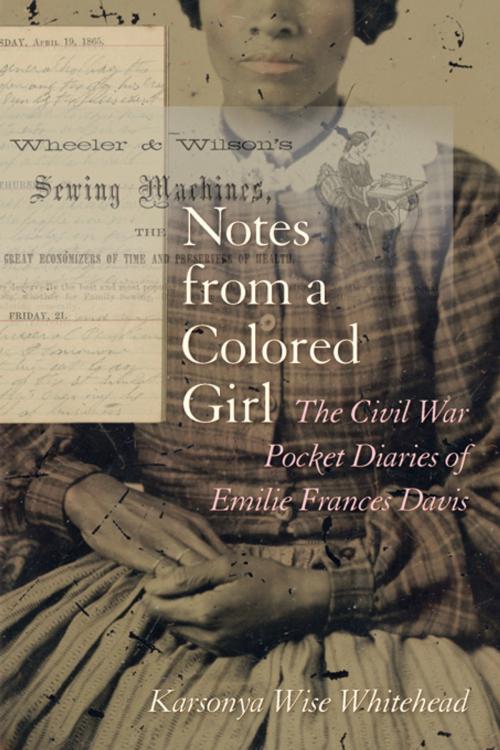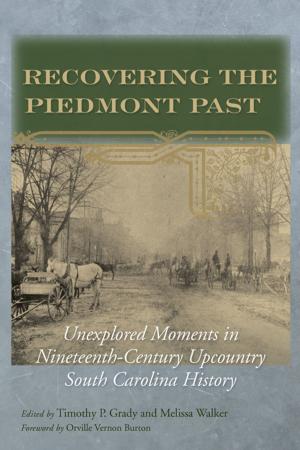Notes from a Colored Girl
The Civil War Pocket Diaries of Emilie Frances Davis
Nonfiction, Social & Cultural Studies, Social Science, Cultural Studies, African-American Studies, History, Americas, United States, Civil War Period (1850-1877), Gender Studies, Women&| Author: | Karsonya Wise Whitehead | ISBN: | 9781611173536 |
| Publisher: | University of South Carolina Press | Publication: | May 14, 2014 |
| Imprint: | University of South Carolina Press | Language: | English |
| Author: | Karsonya Wise Whitehead |
| ISBN: | 9781611173536 |
| Publisher: | University of South Carolina Press |
| Publication: | May 14, 2014 |
| Imprint: | University of South Carolina Press |
| Language: | English |
In Notes from a Colored Girl, Karsonya Wise Whitehead examines the life and experiences of Emilie Frances Davis, a freeborn twenty-one-year-old mulatto woman, through a close reading of three pocket diaries she kept from 1863 to 1865. Whitehead explores Davis's worldviews and politics, her perceptions of both public and private events, her personal relationships, and her place in Philadelphia's free black community in the nineteenth century. Although Davis's daily entries are sparse, brief snapshots of her life, Whitehead interprets them in ways that situate Davis in historical and literary contexts that illuminate nineteenth-century black American women's experiences. Whitehead's contribution of edited text and original narrative fills a void in scholarly documentation of women who dwelled in spaces between white elites, black entrepreneurs, and urban dwellers of every race and class. Notes from a Colored Girl is a unique offering to the fields of history and documentary editing as the book includes both a six-chapter historical reconstruction of Davis's life and a full, heavily annotated edition of her Civil War–era pocket diaries. Drawing on scholarly traditions from history, literature, feminist studies, and sociolinguistics, Whitehead investigates Davis's diary both as a complete literary artifact and in terms of her specific daily entries. From a historical perspective, Whitehead re-creates the narrative of Davis's life for those three years and analyzes the black community where she lived and worked. From a literary perspective, Whitehead examines Davis's diary as a socially, racially, and gendered nonfiction text. From a feminist studies perspective, she examines Davis's agency and identity, grounded in theories elaborated by black feminist scholars. And, from linguistic and rhetorical perspectives, she studies Davis's discourse about her interpersonal relationships, her work, and external events in her life in an effort to understand how she used language to construct her social, racial, and gendered identities. Since there are few primary sources written by black women during this time in history, Davis's diary—though ordinary in its content—is rendered extraordinary simply because it has survived to be included in this very small class of resources. Whitehead's extensive analysis illuminates the lives of many through the simple words of one.
In Notes from a Colored Girl, Karsonya Wise Whitehead examines the life and experiences of Emilie Frances Davis, a freeborn twenty-one-year-old mulatto woman, through a close reading of three pocket diaries she kept from 1863 to 1865. Whitehead explores Davis's worldviews and politics, her perceptions of both public and private events, her personal relationships, and her place in Philadelphia's free black community in the nineteenth century. Although Davis's daily entries are sparse, brief snapshots of her life, Whitehead interprets them in ways that situate Davis in historical and literary contexts that illuminate nineteenth-century black American women's experiences. Whitehead's contribution of edited text and original narrative fills a void in scholarly documentation of women who dwelled in spaces between white elites, black entrepreneurs, and urban dwellers of every race and class. Notes from a Colored Girl is a unique offering to the fields of history and documentary editing as the book includes both a six-chapter historical reconstruction of Davis's life and a full, heavily annotated edition of her Civil War–era pocket diaries. Drawing on scholarly traditions from history, literature, feminist studies, and sociolinguistics, Whitehead investigates Davis's diary both as a complete literary artifact and in terms of her specific daily entries. From a historical perspective, Whitehead re-creates the narrative of Davis's life for those three years and analyzes the black community where she lived and worked. From a literary perspective, Whitehead examines Davis's diary as a socially, racially, and gendered nonfiction text. From a feminist studies perspective, she examines Davis's agency and identity, grounded in theories elaborated by black feminist scholars. And, from linguistic and rhetorical perspectives, she studies Davis's discourse about her interpersonal relationships, her work, and external events in her life in an effort to understand how she used language to construct her social, racial, and gendered identities. Since there are few primary sources written by black women during this time in history, Davis's diary—though ordinary in its content—is rendered extraordinary simply because it has survived to be included in this very small class of resources. Whitehead's extensive analysis illuminates the lives of many through the simple words of one.















